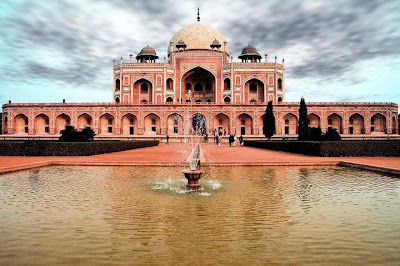The Tomb of Emperor Humayun (1570 AD). Nizamuddin East, New Delhi
Built by Haji Begum, the widow of Mughal Emperor Humanyun in 1570.
Humayun's Tomb in Delhi, the first garden-tomb in the Indian subcontinent, had teased the architectural novelty that Taj Mahal finally gave shape to. This tomb in New Delhi was built by Haji Begum, the Persian widow of Humanyun, at a cost of Rs 1.5 million through 8 years. A complex of buildings displaying Mughal architecture in Nizamuddin East, it consists of the main tomb of the Emperor Humayun as well as several others, including the Barber's Tomb.
Mughal emperor Humayan, was not able to rule for a long time as he met with his untimely death after he falling from the stairs of the Sher Mandal library. Sayyed Muhammad ibn Mirak Ghiyathuddin and his father Mirak Ghiyathuddin brought in from Herat, designed the tomb on the bank of the Yamuna River adjoining the shrine of the Sufi saint of Chisti silsilah, Nizamuddin Auliya.
- Following the Islam saying that paradise is found in the middle of a garden with water flowing through it, Humayun's Tomb in Delhi is situated in the middle of a garden, Char Bagh, which is divided into four parts. 36 squares divide the garden by a grid of water channels and paths and a high rubble wall separate it into four large squares by causeways and channels. This design of laying the gardens in the Persian style was introduced by Babur
- You should watch the black-and-yellow marble tomb of Humayun's wife and the tomb of Humayun's barber known as Nai Ka Gumbad.
- The octagonal tomb crowned by a colossal double dome, is placed on a platform with colonnades that is again faced by a series of cells with arched openings. There are numerous graves under it. The central chamber has four double-storied offsets and contains the cenotaph of the emperor Humayun and his queen Bega Begum.
- Two double-storied gateways, one on the west and the other on the south, guard the enclosure. There is a pavilion in the center of the eastern wall and a hamam or the bath chamber in the center of northern wall.
- The main tomb is placed on the north-south axis. The dome is a complete semi-circle built with red sandstone but bordered with white and black marble.
The Humayun's Tomb, made its place in the UNESCO's list of World Heritage Sites in 1993.
Humayun's Tomb in Delhi, the first garden-tomb in the Indian subcontinent, had teased the architectural novelty that Taj Mahal finally gave shape to. This tomb in New Delhi was built by Haji Begum, the Persian widow of Humanyun, at a cost of Rs 1.5 million through 8 years. A complex of buildings displaying Mughal architecture in Nizamuddin East, it consists of the main tomb of the Emperor Humayun as well as several others, including the Barber's Tomb.
Mughal emperor Humayan, was not able to rule for a long time as he met with his untimely death after he falling from the stairs of the Sher Mandal library. Sayyed Muhammad ibn Mirak Ghiyathuddin and his father Mirak Ghiyathuddin brought in from Herat, designed the tomb on the bank of the Yamuna River adjoining the shrine of the Sufi saint of Chisti silsilah, Nizamuddin Auliya.
- Following the Islam saying that paradise is found in the middle of a garden with water flowing through it, Humayun's Tomb in Delhi is situated in the middle of a garden, Char Bagh, which is divided into four parts. 36 squares divide the garden by a grid of water channels and paths and a high rubble wall separate it into four large squares by causeways and channels. This design of laying the gardens in the Persian style was introduced by Babur
- You should watch the black-and-yellow marble tomb of Humayun's wife and the tomb of Humayun's barber known as Nai Ka Gumbad.
- The octagonal tomb crowned by a colossal double dome, is placed on a platform with colonnades that is again faced by a series of cells with arched openings. There are numerous graves under it. The central chamber has four double-storied offsets and contains the cenotaph of the emperor Humayun and his queen Bega Begum.
- Two double-storied gateways, one on the west and the other on the south, guard the enclosure. There is a pavilion in the center of the eastern wall and a hamam or the bath chamber in the center of northern wall.
- The main tomb is placed on the north-south axis. The dome is a complete semi-circle built with red sandstone but bordered with white and black marble.
The Humayun's Tomb, made its place in the UNESCO's list of World Heritage Sites in 1993.




Comments
Post a Comment